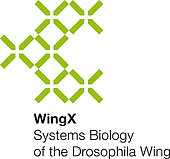WingX
Systems Biology of the Drosophila Wing
This project investigates the processes that occur during wing development in the fruit fly Drosophila melanogaster. The findings should help scientists to gain a better understanding of how organs develop and enable them to make computer simulations of organogensis.
The WingX project studies the development of the Drosophila wing at the systems biology level with the ultimate goal of reproducing the construction of the wing in a computer. This project is therefore inherently interdisciplinary and provides a fertile ground for biologists, physicists, computer scientists, engineers and system biologists to interact. We aim to exploit this interdisciplinarity to form a new generation of scientists capable of transcending disciplines while conducting state-of-the-art research in systems biology. To this effect, we envision projects conducted by pairs of graduate students from different disciplines working together under the supervision of two group leaders. Since systems biology research requires a novel kind of education, the project also includes a training program for students (MSc and PhD) of the associated groups.
Advance the understanding of organogenesis
The developing Drosophila wing is a substantially more challenging system for a systems approach than cellular or sub-cellular systems, to which this type of scientific approach is successfully applied at present. However, the Drosophila wing is well suited as a model system because of its relative simplicity and the high degree of current biological understanding. The results obtained will advance the understanding of organogenesis and set new standards in the application of optical and computational methods for complex biological problems.
Experimental and computational approach
Using advances in developmental genetics that provide us today with the toolkit (morphogens, transcription factors etc.) of organogenesis, we will employ a synergetic experimental and computational approach to identify how this toolkit can be used to build the Drosophila wing of reproducible size and form. We will provide a quantitative description of wing development at a multiscale systems level, as determined by the interaction of processes at the molecular, cellular, and tissue levels. In addition, the methods and results of this program will advance state-of-the-art in developmental biology as spatiotemporal events will be identified at a level of description heretofore not accomplished. For example, in vitro culturing of wing discs allows for high-resolution measurements and perturbation studies using physical, chemical, and genetic tools. Therefore, the development of a reliable culture method to study cell cycle patterns and cell growth is one aim of WingX.
| Principal Investigator | Prof. Ernst Hafen, Institute of Molecular Systems Biology, ETH Zurich |
| Involved Institutions | ETH Zurich, University of Zurich, University of Basel, EPF Lausanne, University of Lausanne |
| Number of Research Groups | 12 |
| Project Duration | Aug. 2008 - Dec. 2012 |
| Approved SystemsX.ch Funds | CHF 7.112 million |
Updated September 2012


